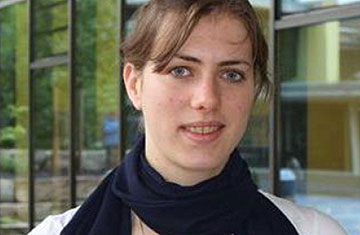
16-year-old university professor Carina Lammle.

This post is in partnership with Worldcrunch, a new global-news site that translates stories of note in foreign languages into English. The article below was originally published in Tages-Anzeiger.
BIBERACH — Carina Lämmle calls it "a little bit unfair..." Teaching at the University of Applied Sciences in Biberach, she is not able to drive herself to school, like most of her own students do.At 16, she is thought to be the youngest lecturer in Germany. And no, she can't even get into the local disco in this southern German college town.
On campus, she's taken for a student. But that, she believes, may be due to the fact that she looks a little older than she is. Lämmle, in fact, is still in high school. She's an 11th grader at Biberach's Pestalozzi Gymnasium. It will be another year-and-a-half before she graduates.
On the day Lämmle gave her first lecture, the auditorium was full. There were the soon-to-graduate bachelor of science students — in their seventh semester of Pharmaceutical Biotechnology — who all had to be there. But fellow teachers were also out in force, there to see for themselves if it was true what Professor Chrystelle Mavoungou had said about Lämmle: this teenager was a "natural-born scientist," who not only knew her subject but also possessed a gift for teaching.
Mavoungou says it's not just just Lämmle's academic gifts that make her such a good teacher. "Ms Lämmle is also somebody who can keep unruly students under control."
Balancing biotech with gymnastics and piano lessons
Lämmle, who hails from the Upper Swabia region of Germany, is almost certainly the youngest college professor in Germany. She was interested in biology, physics and chemistry from the start at high school, but not to the detriment of other activities — gymnastics, tennis and piano playing are also important to her.
She has won various prizes in academic competitions and eventually earned a grant to the Student Research Center in Bad Saulgau, which is where she discovered her passion for a subject many find hard to even pronounce correctly: Massenspektrometrie, or mass spectrometry. Even fewer know the meaning of the discipline: a way of measuring the mass-to-charge ratio of charged particles.
Anybody who doubts Lämmle's pedagogical talents should ask her to describe a mass spectrometer. "Very simply put, it's a big box that makes a lot of noise when you turn it on and that enables you to break chemical substances down to their individual components."
It all began on a tour she was taking of the university in Biberach, when Lämmle noticed that the mass spectrometer on hand was silent. "It's not good for the vacuum pump to leave it off for long periods of time," she told the dean, adding that "in general" you couldn't let a device that costs 500,000 euros just sit there gathering dust. The dean told her that the staff member who'd been using the device had left the university, and for months they'd been looking in vain for a qualified replacement. One thing led to another and Lämmle finally sat down for an interview with Professor Mavoungou, who says she was open-mouthed the whole time she was listening to Lämmle.
Lämmle says she definitely wants to continue working in Mavoungou's department until she graduates from high school. She also says she doesn't yet know what she wants to study at university: "I'm interested in a lot of things."
Says Mavoungou: "I will do everything in my power to keep promoting her."
Also from Worldcrunch:
Help Wanted: Booming Brazil Opens Its Doors to Foreign Executives
— América Economía
In Italy, Ancient Ruins Paved Over to Build Soccer Field
— La Stampa
Mitt Romney's Message for Europe: 'Not One Cent' of Bailout Cash
— La Stampa
